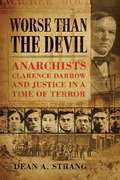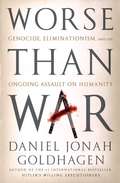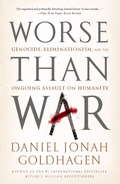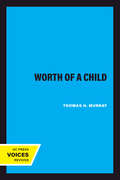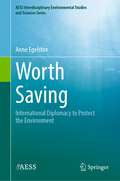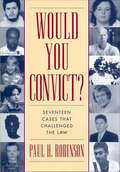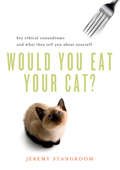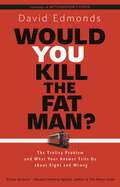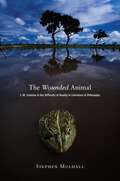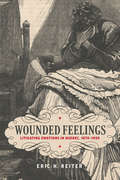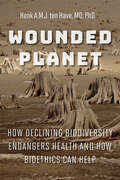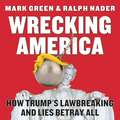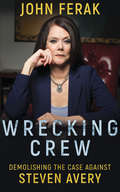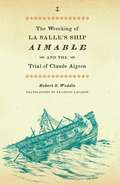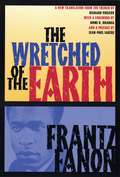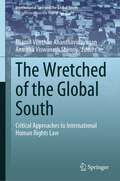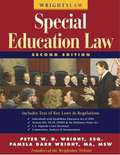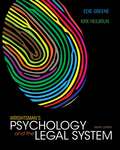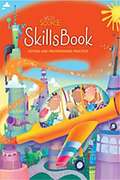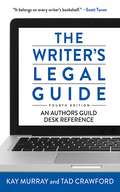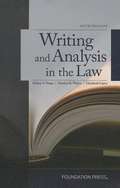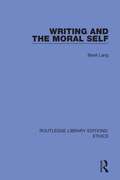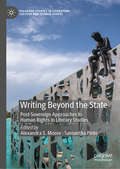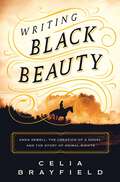- Table View
- List View
Worse than the Devil
by Dean A. StrangIn 1917 a bomb exploded in a Milwaukee police station, killing nine officers and a civilian. Those responsible never were apprehended, but police, press, and public all assumed that the perpetrators were Italian. Days later, eleven alleged Italian anarchists went to trial on unrelated charges involving a fracas that had occurred two months before. Against the backdrop of World War I, and amidst a prevailing hatred and fear of radical immigrants, the Italians had an unfair trial. The specter of the larger, uncharged crime of the bombing haunted the proceedings and assured convictions of all eleven. Although Clarence Darrow led an appeal that gained freedom for most of the convicted, the celebrated lawyers methods themselves were deeply suspect. The entire case left a dark, if hidden, stain on American justice. Largely overlooked for almost a century, the compelling story of this case emerges vividly in this meticulously researched book by Dean A. Strang. In its focus on a moment when patriotism, nativism, and terror swept the nation, Worse than the Devil exposes broad concerns that persist even today as the United States continues to struggle with administering criminal justice to newcomers and outsiders.
Worse Than War: Genocide, Eliminationism, and the Ongoing Assault on Humanity
by Daniel Jonah GoldhagenUntil now, the world's peoples and governments have done little to prevent or stop mass murdering. Today, the world is not markedly better prepared to end this greatest scourge of humanity. The evidence of this failure is overwhelming. It is to be found in Tibet, North Korea, the former Yugoslavia, Saddam Hussein's Iraq, Rwanda, southern Sudan, Democratic Republic of the Congo, and Darfur.
Worse Than War: Genocide, Eliminationism, and the Ongoing Assault on Humanity
by Goldhagen Daniel JonahA paradigm-changing investigation into the phenomenon of genocide and mass killing, by the author of the number one international bestseller "HitlerOCOs Willing Executioners""
The Worth of a Child
by Thomas H. MurrayThomas Murray's graceful and humane book illuminates one of the most morally complex areas of everyday life: the relationship between parents and children. What do children mean to their parents, and how far do parental obligations go? What, from the beginning of life to its end, is the worth of a child?Ethicist Murray leaves the rarefied air of abstract moral philosophy in order to reflect on the moral perplexities of ordinary life and ordinary people. Observing that abstract moral terms such as altruism and selfishness can be buried in the everyday doings of families, he maintains that ethical theory needs a richer description than it now has of the moral life of parents and children. How far should adults go in their quest for children? What options are available to women who do not want to bear a child now? Should couples be allowed to reject a child because of genetic disability or "wrong" gender? How can we weigh the competing claims of the genetic and the rearing parents to a particular child?The Worth of a Child couples impressive learning with a conversational style. Only by getting down to cases, Murray insists, can we reach moral conclusions that are unsentimental, farsighted, and just. In an era of intense public and private acrimony about the place and meaning of "family values," his practical wisdom about extraordinary difficult moral issues offers compelling reading for both experienced and prospective parents, as well as for ethicists, social and behavioral scientists, and legal theorists.
Worth Saving: International Diplomacy to Protect the Environment (AESS Interdisciplinary Environmental Studies and Sciences Series)
by Anne EgelstonThis textbook is intended to be used in an upper-level international environmental issues class as part of the American Environmental Studies and Sciences book series. This class is commonly taught at both the undergraduate and graduate level as part of either an environmental studies program, a political science program, or within a policy track of an environmental science program.Given the length of time that negotiations have occurred, a new generation of students and practitioners will need to understand the complex processes that produced many of our environmental treaties. The majority of the students in environmental studies do not have a background in political science. Moving from a political science approach to an interdisciplinary approach will benefit the students by making the material more accessible.As these fields continue to grow and develop, regulatory compliance becomes increasingly important. Thus, this book is aimed at adding a business and industry perspective to this field where appropriate.
Would You Convict?: Seventeen Cases That Challenged the Law
by Paul H RobinsonAn illuminating exercise that challenges the reader's beliefs about the justice systemA police trooper inspects a car during a routine traffic stop and finds a vast cache of weapons, complete with automatic rifles, thousands of rounds of ammunition, and black ski masks-a veritable bank robber's kit. Should the men in the car be charged? If so, with what? A son neglects to care for his elderly mother, whose emaciated form is discovered shortly before she dies a painful death. Is the son's neglect punishable, and if so how? A career con man writes one bad check too many and is sentenced to life in prison-for a check in the amount of $129.75. Is this just? A thief steals a backpack, only to find it contains a terrorist bomb. He alerts the police and saves lives, transforming himself from petty criminal to national hero. These are just a few of the many provocative cases that Paul Robinson presents and unravels in Would You Convict? Judging crimes and meting out punishment has long been an informal national pasttime. High-profile crimes or particularly brutal ones invariably prompt endless debate, in newspapers, on television, in coffee shops, and on front porches. Our very nature inclines us to be armchair judges, freely waving our metaphorical gavels and opining as to the innocence or guilt-and suitable punishment-of alleged criminals. Confronting this impulse, Paul Robinson here presents a series of unusual episodes that not only challenged the law, but that defy a facile or knee-jerk verdict. Narrating the facts in compelling, but detached detail, Robinson invites readers to sentence the transgressor (or not), before revealing the final outcome of the case. The cases described in Would You Convict? engage, shock, even repel. Without a doubt, they will challenge you and your belief system. And the way in which juries and judges have resolved them will almost certainly surprise you.
Would You Eat Your Cat?: Key Ethical Conundrums and What They Tell You About Yourself
by Jeremy StangroomAre you authoritarian or libertarian? Are we morally obligated to end the world? And just what's wrong with eating your cat? Would You Eat Your Cat? challenges you to examine these and many other philosophical questions. This unique collection of classic and modern problems and paradoxes is guaranteed to test your preconceptions. Jeremy Stangroom creates contemporary versions of famous dilemmas that explore the morality of suicide and the ethics of retribution. He then delves into the background of each conundrum in detail and helps you discover what your responses reveal about yourself with a unique morality barometer. Are you ready to have your best ideas confronted and your ethical foundations shaken? If so, then Would You Eat Your Cat? is the book for you.
Would You Kill the Fat Man?: The Trolley Problem and What Your Answer Tells Us about Right and Wrong
by David EdmondsFrom the bestselling coauthor of Wittgenstein's Poker, a fascinating tour through the history of moral philosophyA runaway train is racing toward five men who are tied to the track. Unless the train is stopped, it will inevitably kill all five men. You are standing on a footbridge looking down on the unfolding disaster. However, a fat man, a stranger, is standing next to you: if you push him off the bridge, he will topple onto the line and, although he will die, his chunky body will stop the train, saving five lives. Would you kill the fat man?The question may seem bizarre. But it's one variation of a puzzle that has baffled moral philosophers for almost half a century and that more recently has come to preoccupy neuroscientists, psychologists, and other thinkers as well. In this book, David Edmonds, coauthor of the bestselling Wittgenstein's Poker, tells the riveting story of why and how philosophers have struggled with this ethical dilemma, sometimes called the trolley problem. In the process, he provides an entertaining and informative tour through the history of moral philosophy. Most people feel it's wrong to kill the fat man. But why? After all, in taking one life you could save five. As Edmonds shows, answering the question is far more complex—and important—than it first appears. In fact, how we answer it tells us a great deal about right and wrong.
The Wounded Animal: J. M. Coetzee and the Difficulty of Reality in Literature and Philosophy
by Stephen MulhallIn 1997, the Nobel Prize-winning novelist J. M. Coetzee, invited to Princeton University to lecture on the moral status of animals, read a work of fiction about an eminent novelist, Elizabeth Costello, invited to lecture on the moral status of animals at an American college. Coetzee's lectures were published in 1999 as The Lives of Animals, and reappeared in 2003 as part of his novel Elizabeth Costello; and both lectures and novel have attracted the critical attention of a number of influential philosophers--including Peter Singer, Cora Diamond, Stanley Cavell, and John McDowell. In The Wounded Animal, Stephen Mulhall closely examines Coetzee's writings about Costello, and the ways in which philosophers have responded to them, focusing in particular on their powerful presentation of both literature and philosophy as seeking, and failing, to represent reality--in part because of reality's resistance to such projects of understanding, but also because of philosophy's unwillingness to learn from literature how best to acknowledge that resistance. In so doing, Mulhall is led to consider the relations among reason, language, and the imagination, as well as more specific ethical issues concerning the moral status of animals, the meaning of mortality, the nature of evil, and the demands of religion. The ancient quarrel between philosophy and literature here displays undiminished vigor and renewed significance.
Wounded Feelings: Litigating Emotions in Quebec, 1870–1950 (Osgoode Society for Canadian Legal History)
by Eric H. ReiterWounded Feelings is the first legal history of emotions in Canada. Through detailed histories of how people litigated emotional injuries like dishonour, humiliation, grief, and betrayal before the Quebec civil courts from 1870 to 1950, it explores the confrontation between people’s lived experience of emotion and the legal categories and terminology of lawyers, judges, and courts. Drawing on archival case files, supplemented by newspapers and contemporary legal writings, it examines how individuals narrated their claims of injured feelings, and how the courts assessed those claims, using legal rules, social norms, and the judges’ own feelings to validate certain emotional injuries and reject others. The cases reveal both contemporary views of emotion as well as the family, gender, class, linguistic, and racial dynamics that shaped those understandings and their adjudication. Examples include a family’s grief over their infant son’s death due to a physician’s prescription error, a wealthy woman’s mortification at being harassed by a conductor aboard a train, and the indignation of two Black men at being denied seats at a Montreal cinema. The book also traces an important legal change in how moral injury was conceptualized in Quebec civil law over the period, as it came to be linked to the developing idea of personality rights. By 1950, the subjective richness of stories of wounded feelings was increasingly put into the language of violated rights, a development with implications for both social understandings of emotion and how individuals presented their emotional injuries in court.
Wounded Planet: How Declining Biodiversity Endangers Health and How Bioethics Can Help
by Henk A.M.J. ten HaveExploring the interconnectedness of human health, biodiversity, and bioethics.We all depend on environmental biodiversity for clean air, safe water, adequate nutrition, effective drugs, and protection from infectious diseases. Today's healthcare experts and policymakers are keenly aware that biodiversity is one of the crucial determinants of health—not only for individuals but also for the human population of the planet. Unfortunately, rapid globalization and ongoing environmental degradation mean that biodiversity is rapidly deteriorating, threatening planetary health on a mass scale.In Wounded Planet, Henk A.M.J. ten Have argues that the ethical debate about healthcare has become too narrow and individualized. We must, he writes, adopt a new bioethical discourse—one that deals with issues of justice, equality, vulnerability, human rights, and solidarity—in order to adequately reflect the serious threat that current loss of biodiversity poses to planetary health. Exploring modern environmental challenges in depth, ten Have persuasively demonstrates that environmental concerns can no longer be separated from healthcare challenges, and thus should be included in global bioethics.Going beyond an individualized perspective, he poses audacious questions: What does it mean that patients are poor or uninsured and cannot afford suggested medicines? How can we deal with the air and water pollution that are producing a patient's illness? How do we respond to patients complaining about the safety and quality of drinking water in their neighborhood? Touching on infectious and noncommunicable diseases, as well as food, medicine, and water, Wounded Planet transcends the limited vision of mainstream bioethics to compassionately reveal how healthcare and medicine must take a broad perspective that includes the social and environmental conditions in which individuals live.
Wrecking America: How Trump's Lawbreaking and Lies Betray All
by Mark Green Ralph Nader"Read Fake President….This book can help us replace Trump with truth." —Gloria Steinem "Terrific new book. Fake President informs as it entertains." --Laurence Tribe An incisive & witty look at the cost of lies on American livesWrecking America is most up-to-date look at Trump's anything-goes "Fascism 2.0" presidency and campaign. It reveals how Trump's daily "twistifications" (a Jefferson coinage) are killing tens of thousands of Americans and millions of American jobs, polluting the air and public debate, selling out his country for personal gain...and trying to "Make the Confederacy Great Again," as he preoccupies himself with golfing, seething, and tweeting. By four-time presidential candidate Ralph Nader and bestselling author Mark Green, Wrecking America organizes Trump's lies and lawbreaking issue-by-issue—focusing on Covid-19 and racial protests. This scathing, witty, accessible paperback is the last up-to-date book on "the Lyin' King" keyed to General Election voters and post-election America.This November will test our 231-year experiment in self-governance like no time since 1860 and 1932. Will it be re-election or realignment? A Fascism for the few or Democracy for all? The wrecking ball of American Brownshirts or a new progressive backlash and era?
Wrecking Crew: Demolishing the Case Against Steven Avery
by John FerakA &“fascinating&” deep dive into the Making a Murderer case. &“Get ready to change your mind or be more convinced than ever&”(Steve Jackson, New York Times bestselling author). In 2016-17, while working for the USA Today Network&’s Wisconsin Investigative Team, author John Ferak wrote dozens of articles examining the murder case again Steven Avery, who had already beat one wrongful conviction only to be charged with the murder of Teresa Halbach in 2005. The case became the wildly successful Netflix Making A Murderer documentary. In Wrecking Crew: Demolishing the Case Against Steven Avery, Ferak lays out in exacting detail the post-conviction strategy of Kathleen Zellner, the high-profile, high-octane lawyer, to free Avery. To write this book, Zellner, perhaps America&’s most successful wrongful conviction attorney, gave Ferak unique access to the exhaustive pro bono efforts she and her small suburban Chicago law firm dedicated for a man she believes to be a victim of an unscrupulous justice system in Manitowoc County. &“If you&’re planning to binge-watch Making a Murderer 2 over the holidays, order John Ferak&’s new book Wrecking Crew, too. Definitive chronicle of criminal justice corruption in Manitowoc County.&”—Michelle Malkin, host of Michelle Malkin Investigates on CRTV
The Wrecking of La Salle's Ship Aimable and the Trial of Claude Aigron
by Robert S. WeddleWhen Robert Cavelier, sieur de La Salle, landed on the Texas coast in 1685, bent on founding a French colony, his enterprise was doomed to failure. Not only was he hundreds of miles from his intended landfall--the mouth of the Mississippi--but his supply ship, Aimable, was wrecked at the mouth of Matagorda Bay, leaving the colonists with scant provisions and little protection against local Indian tribes. In anger and disgust, he struck out at the ship's captain, Claude Aigron, accusing him of wrecking the vessel purposely and maliciously. Captain Aigron and his crew escaped the doomed colony by returning to France on the warship that had escorted the expedition on its ocean crossing. Soon after reaching France, Aigron found himself defendant in a civil suit filed by two of his officers seeking recompense for lost salary and personal effects, and then imprisoned on order of King Louis XIV while La Salle's more serious accusations were being investigated. In this book, Robert Weddle meticulously recounts, through court documents, the known history of Aigron and the Aimable, and finds that despite La Salle's fervent accusations, the facts of the case offer no clear indictment. The court documents, deftly translated by François Lagarde, reveal Captain Aigron's successful defense and illuminate the circumstances of the wreck with Aigron's testimony. Much is also revealed about the French legal system and how the sea laws of the period were applied through the French government's L'Ordonnance de la Marine.
The Wretched of the Earth
by Frantz Fanon Richard PhilcoxA distinguished psychiatrist from Martinique who took part in the Algerian Nationalist Movement, Frantz Fanon was one of the most important theorists of revolutionary struggle, colonialism, and racial difference in history. Fanon's masterwork is a classic alongside Edward Said's Orientalism or The Autobiography of Malcolm X, and it is now available in a new translation that updates its language for a new generation of readers. The Wretched of the Earth is a brilliant analysis of the psychology of the colonized and their path to liberation. Bearing singular insight into the rage and frustration of colonized peoples, and the role of violence in effecting historical change, the book incisively attacks the twin perils of postindependence colonial politics: the disenfranchisement of the masses by the elites on the one hand, and intertribal and interfaith animosities on the other. Fanon's analysis, a veritable handbook of social reorganization for leaders of emerging nations, has been reflected all too clearly in the corruption and violence that has plagued present-day Africa. The Wretched of the Earth has had a major impact on civil rights, anticolonialism, and black consciousness movements around the world, and this bold new translation by Richard Philcox reaffirms it as a landmark book of the 20th century. Show more Show less
The Wretched of the Global South: Critical Approaches to International Human Rights Law (International Law and the Global South)
by Thamil Venthan Ananthavinayagan Amritha Viswanath ShenoyThe books aims to discuss and present an alternative epistemology of human rights, against the background of the globalization from below. The interdependent network of transnational networks, ranging from social movements, NGOs, and other groupings, questions the neoliberal paradigm and a particular set of human rights. This book wishes to transform this discourse on human rights and amplify the subaltern voices. The book also aims to highlight alternative practices of freedom that decenter human rights as a liberation discourse. Following Julia Suarez-Krabbe in “Race, Rights and Rebels”, the authors aim to amend to practices of freedom that center different orders of knowledge on subjectivity and agency. The proposed book, first, situates the problem of representation of the marginalized voices in contemporary legal and political discourse. Second, it offers critiques in theory, and, third, followed by alternative practices that emanate from marginalized localities. In particular, this book wishes to reflect upon alternatives rooted in legal and non-legal responses to address human rights grievances. In the end, this book envisages, along the lines of Frantz Fanon, to vision the possibility of the human by a new concept, addressing the concerns in various ways: As Fanon argued for “a new start”, “a new way of thinking”, and for the creation of a “new man”, it is pertinent to trigger a human rights project from the below.^
Wrightslaw: Special Education Law (2nd Edition)
by Pamela Darr Wright Peter W. D. WrightWrightslaw: Special Education Law, 2nd Edition provides a clear roadmap to the laws and how to get better services for all children with disabilities. This Wrightslaw publication is an invaluable resource for parents, advocates, educators, and attorneys. You will refer to this book again and again.
Wrightsman's Psychology and the Legal System
by Edie Greene Kirk HeilbrunWRIGHTMAN'S PSYCHOLOGY AND THE LEGAL SYSTEM shows you the critical importance of psychology's concepts and methods to the functioning of many aspects of today's legal system. Featuring topics such as competence to stand trial, the insanity defense, expert forensic testimony, analysis of eye witness identification, criminal profiling, and many others, this best-selling book gives you a comprehensive overview of psychology's contributions to the legal system, and the many roles available to trained psychologists within the system.
Write Source Skills Book Grade 3
by Pat Sebranek Dave KemperThis Skills Book Grade 3 contains 1)Proofreading Activities: Using Punctuation, Checking Mechanics, Checking Your Spelling, Using the Right Word 2) Sentence Activities: Sentence Basics, Sentence Problem, Sentence Combining, and 3) Language Activities: Nouns, Pronouns, Verbs, Adjectives and Adverbs, Prepositions Conjunctions Interjections, Parts of Speech.
The Writer's Legal Guide, Fourth Edition: An Authors Guild Desk Reference
by Kay Murray Tad CrawfordIn an increasingly digitized and complex publishing world, writers need to know how to protect themselves against copyright infringement, legal trouble, and unwise concessions to publishers. Still the author's foremost advocate for copyright protection, fair contracts, and free expression, the Authors Guild has once again partnered with Allworth Press to update this invaluable reference. Thoroughly revised to reflect the many changes in the publishing industry, the fourth edition offers plain-English explanations of legal and business aspects of the trade, from electronic rights and ebooks to contracts and accounting. Other topics include: Registering copyrights, including onlineTaxes and bookkeepingFollowing fair use guidelinesNegotiating contracts with publishers and agentsObtaining permissions to use others' workDealing with periodical, syndication, film, television, play, and audio rights agreementsHandling business disputesUnderstanding libel, privacy, and the limits of free expressionAvoiding self-publishing misstepsPlanning authors' estates
Writing and Analysis in the Law, Sixth Edition
by Helene S. Shapo Marilyn R. Walter Elizabeth FajansA standard-setter in American legal education, Writing and Analysis in the Law provides a guide to legal writing, focusing on the importance of clear organization in written communications. Developed as a textbook for a first-year law school course, and is successful in courses for foreign LLM students, the book introduces law students to analyzing and writing about legal authority in cases and statutes. It discusses the structure and persuasive techniques of effective argumentation. The book makes effective use of high-quality and illustrative examples and writing exercises. It also includes access to helpful PowerPoint slides for use in the classroom and class preparation. Lucid, compact, and up-to-date, this work consistently draws acclaim in law schools across the country. <P><P>The sixth edition has been streamlined and designed to be reader friendly: it uses white space, bullet points, tabulation, and headings that chunk information to enable student to grasp information efficiently.
Writing and the Moral Self
by Berel LangOriginally published in 1991, this book analyses the relation between writing and ethics in a number of social contexts – in politics, as language discloses its connections to the institutions of totalitarianism and democracy; in the university, as contemporary scholarly ideals find an uncomfortably accurate representation in the stylistic forms of academic writing; in daily social practice, ranging from the status of truth in journalistic writing to the connection between pronouns and affirmative action; and finally in the ethical structure of language itself.
Writing Beyond the State: Post-Sovereign Approaches to Human Rights in Literary Studies (Palgrave Studies in Literature, Culture and Human Rights)
by Samantha Pinto Alexandra S. MooreThis book investigates the imaginative capacities of literature, art and culture as sites for reimagining human rights, addressing deep historical and structural forms of belonging and unbelonging; the rise of xenophobia, neoliberal governance, and securitization that result in the purposeful precaritization of marginalized populations; ecological damage that threatens us all, yet the burdens of which are distributed unequally; and the possibility of decolonial and posthuman approaches to rights discourses. The book starts from the premise that there are deep-seated limits to the political possibilities of state and individual sovereignty in terms of protecting human rights around the world. The essays explore how different forms, materials, perspectives, and aesthetics can help reveal the limits of normative human rights and contribute to the cultural production of new human rights imaginaries beyond the borders of state and self.
Writing Black Beauty: Anna Sewell, the Creation of a Novel, and the Story of Animal Rights
by Celia BrayfieldThe story of a remarkable woman who wrote a novel that not only became a classic, but also changed the way human society views and treats animals. Born in 1829 to a young Quaker couple, Anna Sewell grew up in poverty in London. She was fourteen when she fell and injured her ankle, which left her permanently disabled. Rejecting the life of a Victorian invalid, she developed an extraordinary empathy with horses, learning to ride side-saddle and to drive a small carriage. Rebellious and independent-minded, Anna suffered periods of severe depression as a young woman. She left the Quaker movement, but remained close friends with the women writers and abolitionists who had been empowered by its liberal principles. It was not until she became terminally ill, aged 51, that she found the courage to write her own book. Tragically, she died just five months after the book was published in 1877. Black Beauty is now recognised as the first anthropomorphic novel, and it had an extraordinary emotional impact on readers of all ages. After modest success in Britain, it was taken up by a charismatic American, George Thorndike Angell, a campaigner against animal cruelty who made it one of the bestselling novels of all time. Using newly discovered archive material, Celia Brayfield shows Anna Sewell developing the extraordinary resilience to overcome her disability, rouse the conscience of Victorian Britain and make her mark upon the world.
